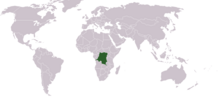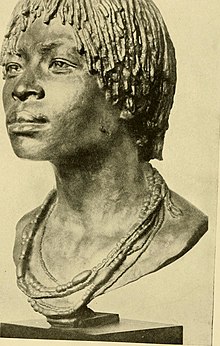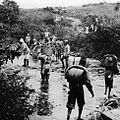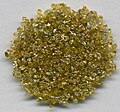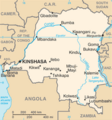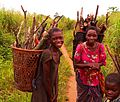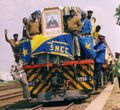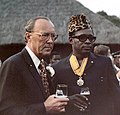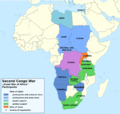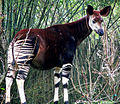Portal:Democratic Republic of the Congo
The Democratic Republic of the Congo Portal
The Democratic Republic of the Congo (also abbreviated as DR Congo,DRC, the DROC, and RDC (in French)) is a country in Central Africa. By land area, the DRC is the second-largest country in Africa and the 11th-largest in the world. With a population of around 105 million, the Democratic Republic of the Congo is the most populous Francophone country in the world, and the fourth-largest in Africa. The national capital and largest city is Kinshasa, which is also the economic center. The country is bordered by the Republic of the Congo, Central African Republic, South Sudan, Uganda, Rwanda, Burundi, Tanzania (across Lake Tanganyika), Zambia, Angola, the Cabinda exclave of Angola, and the South Atlantic Ocean. Centered on the Congo Basin, the territory of the DRC was first inhabited by Central African foragers around 90,000 years ago and was reached by the Bantu expansion about 3,000 years ago. In the west, the Kingdom of Kongo ruled around the mouth of the Congo River from the 14th to 19th centuries. In the northeast, center, and east, the kingdoms of Azande, Luba, and Lunda ruled from the 16th and 17th centuries to the 19th century. King Leopold II of Belgium formally acquired rights to the Congo territory from the colonial nations of Europe in 1885 and declared the land his private property, naming it the Congo Free State. From 1885 to 1908, his colonial military forced the local population to produce rubber and committed widespread atrocities. In 1908, Leopold ceded the territory, which thus became a Belgian colony. Congo achieved independence from Belgium on 30 June 1960 and was immediately confronted by a series of secessionist movements, the assassination of Prime Minister Patrice Lumumba, and the seizure of power by Mobutu Sese Seko in a 1965 coup d'état. Mobutu renamed the country Zaire in 1971 and imposed a harsh personalist dictatorship until his overthrow in 1997 by the First Congo War. The country then had its name changed back and was confronted by the Second Congo War from 1998 to 2003, which resulted in the deaths of 5.4 million people. The war ended under President Joseph Kabila, who governed the country from 2001 to 2019, under whom human rights in the country remained poor and included frequent abuses such as forced disappearances, torture, arbitrary imprisonment and restrictions on civil liberties. Following the 2018 general election, in the country's first peaceful transition of power since independence, Kabila was succeeded as president by Félix Tshisekedi, who has served as president since. Since 2015, the Eastern DR Congo has been the site of an ongoing military conflict in Kivu. The Democratic Republic of the Congo is extremely rich in natural resources but has suffered from political instability, a lack of infrastructure, corruption, and centuries of both commercial and colonial extraction and exploitation, followed by more than 60 years of independence, with little widespread development. Besides the capital Kinshasa, the two next largest cities, Lubumbashi and Mbuji-Mayi, are both mining communities. The DRC's largest export is raw minerals, with China accepting over 50% of its exports in 2019. In 2021, DR Congo's level of human development was ranked 179th out of 191 countries by the Human Development Index and is classed as a least developed country by the UN. , following two decades of various civil wars and continued internal conflicts, around 600,000 Congolese refugees were still living in neighbouring countries. Two million children risk starvation, and the fighting has displaced 4.5 million people. The country is a member of the United Nations, Non-Aligned Movement, African Union, COMESA, Southern African Development Community, Organisation Internationale de la Francophonie, and Economic Community of Central African States. (Full article...) Selected article -The Kongo people (Kongo: Bisi Kongo, EsiKongo, singular: Musi Kongo; also Bakongo, singular: Mukongo or M'kongo) are a Bantu ethnic group primarily defined as the speakers of Kikongo. Subgroups include the Beembe, Bwende, Vili, Sundi, Yombe, Dondo, Lari, and others. They have lived along the Atlantic coast of Central Africa, in a region that by the 15th century was a centralized and well-organized Kingdom of Kongo, but is now a part of three countries. Their highest concentrations are found south of Pointe-Noire in the Republic of the Congo, southwest of Pool Malebo and west of the Kwango River in the Democratic Republic of the Congo, north of Luanda, Angola and southwest Gabon. They are the largest ethnic group in the Republic of the Congo, and one of the major ethnic groups in the other two countries they are found in. In 1975, the Kongo population was reported as 4,040,000. (Full article...)General images -The following are images from various Democratic Republic of the Congo-related articles on Wikipedia.
This is a Good article, an article that meets a core set of high editorial standards.
From 1885 to 1908, many atrocities were committed in the Congo Free State (today the Democratic Republic of the Congo) under the absolute rule of King Leopold II of Belgium. These atrocities were particularly associated with the labour policies, enforced by colonial administrators, used to collect natural rubber for export. Combined with epidemic disease, famine, and falling birth rates caused by these disruptions, the atrocities contributed to a sharp decline in the Congolese population. The magnitude of the population fall over the period is disputed, with modern estimates ranging from 1.5 million to 13 million. At the Berlin Conference of 1884–1885, the European powers allocated most of the Congo Basin region to a supposedly philanthropic organisation run by Leopold II, who had long held ambitions for colonial expansion. The territory under Leopold's control exceeded 2,600,000 km2 (1,000,000 sq mi), more than 85 times the territory of Belgium; amid financial problems, it was directed by a tiny cadre of administrators drawn from across Europe. Initially the quasi-colony proved unprofitable and insufficient, with the state always close to bankruptcy. The boom in demand for natural rubber, which was abundant in the territory, created a radical shift in the 1890s—to facilitate the extraction and export of rubber, all vacant land in the Congo was nationalised, with the majority distributed to private companies as concessions. Some was kept by the state. Between 1891 and 1906, the companies were allowed free rein to exploit the concessions, with the result being that forced labour and violent coercion were used to collect the rubber cheaply and maximise profit. The Free State's military force, the Force Publique, enforced the labour policies. Individual workers who refused to participate in rubber collection could be killed and entire villages razed. (Full article...)
This is a Featured article, which represents some of the best content on English Wikipedia..
Jean Bolikango, later Bolikango Akpolokaka Gbukulu Nzete Nzube (4 February 1909 – 17 February 1982), was a Congolese educator, writer, and politician. He served twice as Deputy Prime Minister of the Republic of the Congo (now the Democratic Republic of the Congo), in September 1960 and from February to August 1962. Enjoying substantial popularity among the Bangala people, he headed the Parti de l'Unité Nationale and worked as a key opposition member in Parliament in the early 1960s. Bolikango began his career in the Belgian Congo as a teacher in Catholic schools, and became a prominent member of Congolese society as the leader of a cultural association. He wrote an award-winning novel and worked as a journalist before turning to politics in the late 1950s. Though he held a top communications post in the colonial administration, he became a leader in the push for independence, making him one of the "fathers of independence" in the Congo. The Republic of the Congo became independent in 1960 and Bolikango attempted to organise a national political base that would support his bid for a prestigious office in the new government. He succeeded in establishing the Parti de l'Unité Nationale and promoted both a united Congo and strong ties with Belgium. Older than most of his contemporaries and commanding significant respect—especially among his Bangala peers, he was seen as the Congo's "elder statesman". Regardless, his attempts to secure a position in the government failed and he became a leading member of the opposition in Parliament. (Full article...)
WikiProjectsTopicsCategoriesRelated portalsAssociated WikimediaThe following Wikimedia Foundation sister projects provide more on this subject:
Discover Wikipedia using portals | ||||||||



